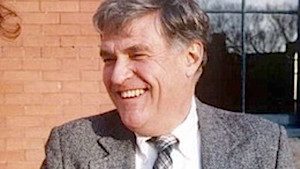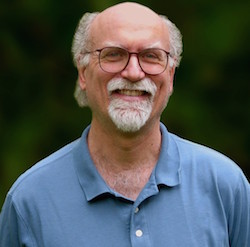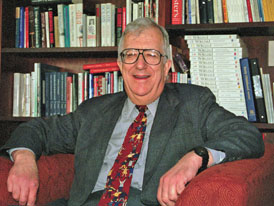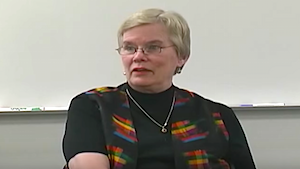“Name five educators you most admire.”
When my colleague John Norton asked me this question recently, my first response was concern: Only five? There are so many educators – both still active and those who have passed on – whom I admire.
After several days of reflecting and, quite frankly, worrying about John’s challenge, I decided to make this topic a series. Occasionally, I’ll write a post highlighting several educators who have deeply influenced my thinking, my work, and my path. And I’ll always ask readers to share some of your special influencers too.
Let me start by mentioning someone who taught and inspired me, long ago.
We all have some teachers from our own school days who deeply influenced our lives. At the top of that list for me was Mrs. Carla McGee, my high school speech teacher. She saw something in me that I didn’t see. She recruited me for the speech and debate team and wouldn’t take no for an answer. I remember her telling me, “You may not believe you can do it, but I KNOW you can.” And, I did!
So much of who I am and of what I do was influenced by her. My biggest regret is that I didn’t thank her more often for making such a difference in my life.
It also seems fitting to include three more well-known trailblazers who are no longer with us but who continue to influence my life and thinking.
The essential Ted Sizer
Founder of the Coalition for Essential Schools, Ted Sizer‘s work has helped shape our ABPC networks and continues to influence our endeavors. Scrolling through the internet for reminders of his impact, I came across this statement Sizer made at a symposium in 1987:
 “We believe the primary purpose of school is to develop students’ intellect. That is essential for everybody in society. … We believe one learns best by doing things—not by being told, but being engaged. … So students need to be the workers, not the teacher. … You can’t treat students like Frank Perdue treats his chickens. We need to respect their differences. … As a teacher, you can’t have 175 students. You can’t know that many minds and understand how they make mistakes.
“We believe the primary purpose of school is to develop students’ intellect. That is essential for everybody in society. … We believe one learns best by doing things—not by being told, but being engaged. … So students need to be the workers, not the teacher. … You can’t treat students like Frank Perdue treats his chickens. We need to respect their differences. … As a teacher, you can’t have 175 students. You can’t know that many minds and understand how they make mistakes.
We need to take students seriously. Don’t let any kids feel anonymous. We need to develop their minds and develop their character. … These are the ideas that drive the Coalition of Essential Schools.
If they are taken seriously, they imply an ambitious change in the way schools organize themselves.” (For the entire article, click here)
Teaching designer Grant Wiggins
Grant Wiggins died unexpectedly at age 64 last year. He was the co-creator of Understanding by Design (UbD) and author – with Jay McTighe – of a series of books that have improved teaching and learning for many, many thousands of students.
 I was a subscriber and regular reader of his blog and still miss my regular infusion of Wiggins wisdom. His humble nature and willingness to engage with those interested in dialoguing with him are traits I deeply admire, along with his fierce determination to raise teaching to full professional status.
I was a subscriber and regular reader of his blog and still miss my regular infusion of Wiggins wisdom. His humble nature and willingness to engage with those interested in dialoguing with him are traits I deeply admire, along with his fierce determination to raise teaching to full professional status.
His blog often addressed issues that, at first glance, seemed disconnected to education and to UbD. In one blog post, he reflected on being in Paris during the January 2015 terrorist attacks. He linked this attack and the U.S. attack on September 11, 2001 to education and specifically UbD and he explained his rationale this way:
We are talking about understanding and a lack of understanding – in this case, with very high stakes. It is crucial that we learn to understand – not like or respect, but understand! – why young men become alienated from civilized life broadly and school specifically, and resort to murder in the name of THEIR understanding. In the language of the 6 facets, we have to have the courage and the intellectual integrity to empathize and have perspective.
Interestingly, when times get tough, as they are now, empathy is viewed as a sell-out, as dangerous, as providing respect and legitimacy to the Other, to the Enemy. But that is fearful thoughtlessness. Our only hope in facing this crisis is to better understand why people think and act as they do – whether we like or detest what they do. No good comes from dismissing them as ‘evil’ and ending all thought in our moral smugness.
It is not a stretch, I believe, to see our most alienated young people in school as similar in psychological state to these radicalized Islamic fighters. We have seen this play out in kids becoming gang members; we have seen it play out in school shootings by students.
No good ever came from boys becoming increasingly marginalized and made to feel like outsiders and incompetents. That’s the pool from which Al Qaeda most successfully draws and it is the pool from which our lone wolf student shooters come. It is also, more mundanely, why boys drop out psychically from their work and just go through the motions.
What role, then, do we as educators have to play in this crisis? A very important one, I think. It is imperative that we aggressively fight bullying and all ‘softer’ forms of marginalization of students. But as importantly, it is imperative that we find countless ways – as part of curriculum – to make ALL learners feel competent and a part of something worthwhile.
Teacher champion Al Shanker
Albert Shanker was the leader of the American Federation of Teachers for many years. Some of you may be scratching your head right now wondering why a union head is one of my most admired educators. Well, Al Shanker was not a traditional union leader. He was a visionary, always looking forward, and always stressing the importance of serving students well.
 He was also a bridge-builder. It was not uncommon to hear him speak at a Business Roundtable meeting. He was open to differentiated pay, charter schools, and innovation so long as teacher leadership was honored and encouraged He is remembered fondly by most everyone who every met him.
He was also a bridge-builder. It was not uncommon to hear him speak at a Business Roundtable meeting. He was open to differentiated pay, charter schools, and innovation so long as teacher leadership was honored and encouraged He is remembered fondly by most everyone who every met him.
When I think of Al Shanker, I think of someone who sought common ground, always reminding those with whom he worked that it was about student success. You can read Checker Finn’s blog about Shanker here. Finn is the former head of the right-leaning Fordham Foundation. In Finn’s blog, he quoted something Shanker mentioned in1989 at an education summit of business leaders, governors, and educators:
“The top of the agenda,” Shanker wrote, “should be the issue of national goals and standards and a system of assessments to go along with them. We’ve had a school reform movement going for six years now, and we still haven’t decided what our students should know and be able to do….[I]t’s possible to set national goals and standards—even establish a national assessment program—and still leave a tremendous amount of flexibility for states and local school districts.”
These three men were very different educators, yet all were deeply committed to improving education for every child. My future installments will feature many influencers who are still with us, including many women of brilliant insight. In fact, let me feature one of those women in this first post.
Carol Ann Tomlinson: Teaching differently
The first thing I do when I receive a new issue of Educational Leadership is turn to Carol Ann Tomlinson’s column. Her writing is always insightful and always prompts deep thinking and reflection. Tomlinson is the William Clay Parrish Jr. Professor and Chair of Educational Leadership, Foundations, and Policy at the University of Virginia.
 If you are interested in strengthening differentiated instruction, Dr. Tomlinson is your go-to source. And, as an added bonus, you’ll find her modeling a deep commitment to all students, regardless of their race, class, or capacity for intellectual achievement.
If you are interested in strengthening differentiated instruction, Dr. Tomlinson is your go-to source. And, as an added bonus, you’ll find her modeling a deep commitment to all students, regardless of their race, class, or capacity for intellectual achievement.
Several years ago, I had the good fortune of interviewing Dr. Tomlinson by email. You can read the entire interview here. One of the questions I asked her related to a story she shared about a seventh grade boy in her book, Assessment and Student Success in a Differentiated Classroom.
Tomlinson was in her third year of teaching. During the second week of school, the seventh grader confided in her that he couldn’t read. I was so struck by this story and her response that I asked her about it. Here’s what she told me:
I understood almost instantly that the boy you are describing had taken a huge risk in confessing his problem to a stranger in the school corridor. It was a cry for help, and I knew I couldn’t walk away from him. I worked really hard with the student and he invested all he had in his growth as well.
His reading level improved markedly. But I learned way more from the experience than he did. I learned that what we’ve now come to call “differentiation” works much more “naturally” when I understand that most students will need me in different ways at least some of the time, than when I see differentiation as something only for one or two outliers.
I learned to organize my curriculum with greater clarity, which helped me know what to differentiate and for whom. I learned the importance of my interactions with students and the importance of my “public” messages about student capacity in making differentiation sensible in students’ eyes. I learned about the imperatives of flexible grouping and respectful tasks.
While I didn’t name most of those things in the early years of my learning, this courageous little fella was the catalyst for the rest of my career in terms of seeing the humanity of every student and responding accordingly.
It’s also important to say that I generally had no idea whether what I was doing with him was “right.” I just knew I had to try. At that point, I had no training in teaching reading, curriculum design, assessment, etc. I just tried something, studied what happened, and either maintained a direction or changed it depending on what I saw. As teachers, we need to trust our common sense and instincts.
Your turn to share
So now it’s your turn. I always blog in hope that some of you who read this far will begin a dialogue in the comments. So please, share a few of the educators (past and present) who have had a memorable impact on your work. Whether they are well-known in the world of education or – like my speech teacher – not so famous, we’d like to hear about them and why they are special to you.
Let’s get a dialogue going. The benefits will be at least two-fold. First, we’ll learn from each other. And, second, we’ll honor those who have made such a difference in our lives.
________
Cathy Gassenheimer is Executive Vice President of the Alabama Best Practices Center.


0 Comments on "Honoring Our Influencers: Five Educators I Admire"